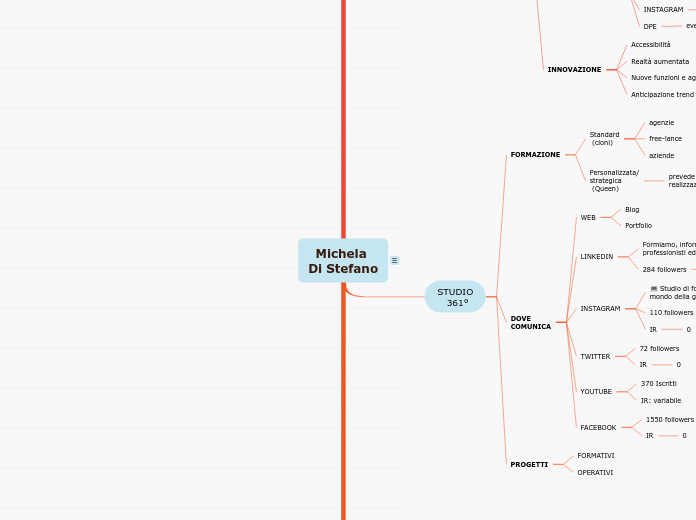realizată de Silvia Platania 4 ani în urmă
352
Michela Di Stefano

realizată de Silvia Platania 4 ani în urmă
352

Mai multe ca aceasta
Michela Di Stefano è la Regina dell’editoria digitale.
La stella polare, punto di riferimento per tutti gli internauti digitali alla ricerca della Via per padroneggiare tutte le risorse offerte dalla tecnologia.
Intuisce, orienta e aggiorna le conoscenze del graphic design, proiettando i professionisti verso il futuro.
Grazie alle sue conoscenze, libera la creatività dalle catene delle procedure, ottimizzando l’utilizzo dei programmi di uso quotidiano. 2/3 del tempo risparmiato.
Attraverso l’uso dei programmi, crea strategie digitali integrate nelle agenzie e nelle aziende.
In questo modo il meccanismo non subisce ritardi e le risorse sono valorizzate al massimo.
VALUE (Valori)
Ottimizzare i risultati
Aprire le porte della conoscenza
Rendere efficace ed efficiente il lavoro
Liberare la creatività incatenata dalle problematiche legate ai problemi tecnici.
VALUE PROPOSITION (Proposta di valore)
Libero la creatività dalla catene dell’operatività
Aggiungo cavalli e potenza al tuo motore
Velocizzo i processi
26 anni di pratica su campi:
7 di tipografia
4 anni web designer
1 anno agenzia pubblicitaria -creatività- stampa grande formato, gadget, e gestione clienti.
Hai uno stile di comunicazione, quando insegni, che permette alle persone di imparare, divertendosi, con una CARICA, energia, entusiasmo, passione
era presente all’esordio del desktop publishing. Dai lucidi, dai caratteri trasferibili al computer! Ho guidato le tipografie nel passaggio da analogico a digitale.
Fai aggiornamenti all’estero apprendendo concetti che non sono presenti nei classici corsi e tutorial.
Saper usare non significa saper insegnare.

To name your story, you have to think about the overall message and what you want your audience to understand from the story. Also, make it relevant and easy to remember.
The ending of a story is essential. We all know that if the ending is weak, what happened before loses its importance. So make it unpredictable, but fair. A resolved ending answers all the questions and ties up any loose threads from the plot.
1
The middle of the story is where you add layers of complications that will lead to the end. Reveal more about the character's journey. Did their personality go through changes? How did they overcome the challenges? And as you build up the story’s central conflict, make it more personal to that character. Also, from the middle act, you have to lead into the final act.
Your character(s) need(s) motivation in order to solve the challenge(s).
Secondary characters might also have motives that lead them to cross paths with the main character or which might trigger them to help the main character.
Why does your character need to confront this challenge? What does he/she expect to accomplish by solving it?
See a few examples:
This is the closure section of the story.
See examples of possible outcomes below:
1550 followers
IR: variabile
370 Iscritti
72 followers
IR
0
110 followers
💻 Studio di formazione e progettazione a 361° nel mondo della grafica e dell’editoria
284 followers
IR: 0
Formiamo, informiamo e ispiriamo professionisti ed aziende di successo
Try answering these questions to come up with a closure:
- Have all the problems been solved?
- Is there a clear picture of what happens with each character in the story?
- Has the challenge transformed your main character?
- How do the characters feel in the end?
Portfolio
Blog
Each story has a main character and that character usually needs to solve a problem or challenge. The character's challenge is the one that creates tension throughout the story.
Type in any other challenges which other characters in the story need to face.
prevede lo studio e l'analisi dei flussi e la realizzazione di un percorso ad hoc.
In most stories, there are 3 challenges. The number 3 is a mystical number symbolizing completeness. Try to come up with interesting challenges with which your character needs to struggle.
See a few examples below:
aziende
free-lance
In the beginning of the story (or the exposition), you will need to introduce the setting and characters. You might also want to introduce the main conflict. This part of the story is important because it gives the reader necessary background information and maybe even a first insight into a character’s personality.
The setting (time & place) of a story can change throughout the plot.
Sensory details include sight, sound, touch, smell, and taste. These details are important because they create depth in your setting.
See a few examples below:
evento fisico
The weather is an important element in your story because it can highly influence the ambiance and the mood of the characters.
Mirror contenuti FB
The most affected character is the main character. Write down here if he/she is affected by these weather conditions in any way. For example, if they lost a family member or their home during a hurricane, etc.
The time of the story can also change. It can describe the event of a single day or can include an entire year's plot. Anyway, don't forget to mention it.
Mirror blog-Stile news-ansa
Your story can take place wherever your imagination will take you to.
For example: in an elevator, in an enchanted forest, etc. Don't forget to give details of the environment each time the setting changes, otherwise, the story can be confusing. Also, mention the seasons as each of them has unique weather and events.
contenuto tradotto
scuole
Add other qualities/attributes of the character.
corsi per freelance
aziende con reparto grafico
Which traits best describe the character's personality? Choose more if necessary:
agenzie
Choose the type of your chacter:
online
What is your character's main goal?
webinar
videocorsi
Characters are essential to a good story. Usually, the protagonist(s) is/are the most affected by the plot. Introduce a character by focusing on their actions, interests, and occupation, as the physical appearance doesn't make a difference in most cases.
Type in the name of your character.